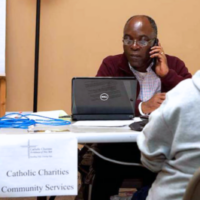Oakland, CA—It’s not only nurses and teachers: more than one in four workers in the United States need a license in order to work in their chosen occupation. Thirty-nine states and the District of Columbia have laws on the books to broadly reduce job licensing restrictions faced by people with arrest or conviction records. But a first-ever analysis of these laws by the National Employment Law Project reveals that they have largely fallen short of their aim.
“Blanket bans are preventing people with convictions from entering state-regulated occupations, and although more states are paying attention to this issue, stronger reforms are needed,” said Michelle Natividad Rodriguez, NELP senior staff attorney and report lead author. “Communities of color are disproportionately impacted by these barriers. Given that nearly one in three adults in the U.S. has a record, the effects on communities and our nation’s economy are far-reaching. Any serious effort to address racial disparities in employment must root out unwarranted barriers to occupational licenses.”
In recent years, policymakers have turned to fair-chance hiring reforms, including “ban the box” and other policies regulating the use of criminal background checks, to dismantle unfair hiring barriers faced by people with records. Although ban-the-box policies have reached a tipping point—they now cover more than half the U.S. population and have been adopted by 23 states and more than 100 cities and counties—bans disqualifying people with convictions from licenses remain entrenched in many state occupational laws.
The American Bar Association has documented more than 27,000 state occupational licensing restrictions nationwide against people with arrest and conviction records. Most of these restrictions—19,000 of them—are permanent disqualifications that last a lifetime, and 11,000 are mandatory disqualifications, for which licensing agencies have no choice but to deny a license.
“Major reform of state occupational licensing barriers against people with records is necessary if we’re going to make headway in giving jobseekers struggling to overcome the stigma of a record a fair chance to contribute to their communities, participate in the economy, and find good work that can sustain their families,” said Beth Avery, NELP staff attorney and report co-author.
The report offers a detailed analysis of laws in 39 states and the District of Columbia that aim to reduce the barriers preventing people with records from obtaining the state licenses necessary to practice a variety of professions. Grading the laws, the report finds that most fall short of effectively increasing opportunities in state-licensed occupations for people with records. Only one state’s law—Minnesota’s—was deemed “Most Effective”; laws in five states—Connecticut, Hawaii, Maine, New Hampshire, and New Jersey—were deemed “Satisfactory”; most states’ laws were found to be “Minimal” or “Unsatisfactory.”
“Although the prevalence of ‘Unsatisfactory’ grades for the current state laws points to the need for stronger reform, it’s clear that there is increasing interest among state policymakers to remove unnecessary disqualifications of people with records,” said Avery. “Just in this last legislative cycle, lawmakers introduced bills addressing criminal record licensing barriers in at least 11 states: Alabama, Georgia, Illinois, Kansas, Maryland, New Jersey, New York, Oklahoma, Tennessee, Vermont, and Wisconsin.”
The report provides a model state law, policy recommendations for state lawmakers, and a state-by-state analysis of existing laws, all of which highlight the legal reforms necessary to increase opportunities for people with records in licensed occupations.
DOWNLOAD THE REPORT:
Unlicensed & Untapped: Removing Barriers to State Occupational Licenses for People with Records
###
Related to
The Latest News
All newsNELP Urges New York Governor Kathy Hochul to Delay Flawed Transition of Medicaid CDPAP Homecare Program to Avoid Harm to Clients and Workers

News Release
NELP Joins Amicus Brief in U.S. Supreme Court Religious Exemption from UI Case

Blog
Northwest Public Broadcasting: Striking Workers in Washington Could Get Access to Unemployment Claims If Bill Passes

Press Clips
